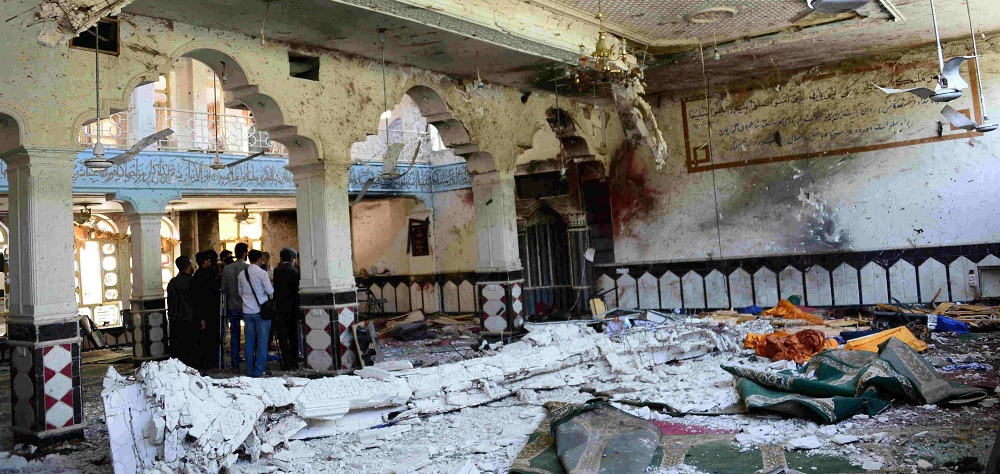Alwaght- Suicide blasts targeting Shiite sites in various Afghanistan cities have been making important headlines for media in the past few months. On April 21, a explosion at a Shiite mosque in Mazar-i-Sharif killed at least 30 and injured dozens. ISIS terrorist group claimed responsibility for the blast. The terrorist group also claimed it carried out another attack in Kunduz, killing 4. Over the past few days, the Afghan officials confirmed that dozens were killed in four bombings across the country.
Talking to Afghanistan affairs expert Nozar Shafee, Alwaght asked about the consequences of these attacks against the Shiites and what they can do for security.
Taliban indirectly responsible for the attacks on the Shiites
When asked about the stepped up attacks on the Shiites in Afghanistan, Mr Shafee said that basically the government is responsible for the security of the society.
"So, we can put the responsibility of Afghanistan on the Taliban that rose to rule following the Kabul developments last year. If the Taliban cannot secure the country, their government is a failed one. The failed governments need support from the international community; namely the other countries should help that specific government so that it can restore security and stability."
He continued that in the current situation if the Taliban cannot take responsibility for the massacre of their citizens, they must seek help from other actors and the international community. The problem now, however, is that the Taliban have not been recognized by the international community as a legitimate government, and such a request by them is not possible to meet response.
"The question now is what to do if the Taliban lack the capability to run the country under the shadow of lack of international legitimacy? There may be two leading solutions. One is for humanitarian intervention which is largely justified under the UN doctrine of the responsibility to protect the civilians. Another solution is self-protection; in the sense that the social groups under the threat themselves take up arms for security.
Taliban should take special measures for security of the Shiites
Commenting on what the Taliban can do for the security of the Shiites, Mr Shafee said that the Taliban are indirectly responsible for what happened despite not being involved.
"They basically address security in a discriminatory manner. In other words, the part of the country that is related to them ethnically is fully protected but other communities and ethnic groups do not have special protection. The Taliban know what ISIS is thinking and ideology is and thus the mosques and schools in Shiite neighborhoods are under threat. Therefore, it should deploy special security forces in these places. The security that the Taliban provides is targeted and specific. In some areas, there is complete security, but in others, not only is security not available, but it also exacerbates insecurity."
ISIS seeking genocide and ethnic cleansing against Hazaras of Afghanistan
Alwaght asked about the goals behind ISIS terrorist attacks on the Shiites. Mr Shafee replied that "first of all, it should be noted that the ISIS is a group that has failed in Iraq and Syria and is now focusing on Afghanistan. Basically, the Americans opened the way for ISIS to enter Afghanistan. Part of the defeat in Syria was because of involvement of fighters from Afghanistan, so the group is now seeking revenge on the Hazara ethnic population. In the current situation, the main goal of ISIS is to cleanse ethnically this ethnic group. "So, we can suggest that the Hazara ethic group is under a existential threat."
The Israeli regime is the main gainer of Afghanistan crisis
On the effects of continuous terrorist attacks, Mr Shafee held that essentially we need to take into consideration that Afghanistan's political developments are something various regional and international actors have special sensitivity to.
"What happened in Afghanistan is way more important than Ukraine developments and should be addressed by the international community. It is now essential that the United Nations and regional and transnational actors respond to the recent events in Afghanistan. Because in the 21st century, the human rights issue creates the need for different actors to get involved. In the midst of the recent crisis in Afghanistan, the Israeli regime can basically be considered the gainer of the equations. Pursuing a doctrine of incitement and division, Tel Aviv is seeking to put West Asian countries face to face using the gaps in their views on Afghanistan."
Shiites can adopt self-protection model
Asked about a solution the Shiites can make if these attacks by radical groups continue, Mr Shafee responded that if the Taliban cannot save the security of them and the country, the Shiites should definitely resort to self-protection. "It is certain that continuation of anti-Shiite attacks in the not-so-distant future would involve the whole region."



























